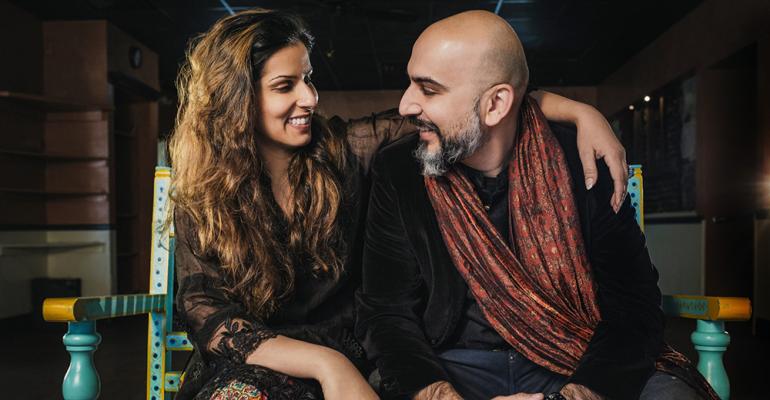While Americans may have become familiar with Indian and Mediterranean cuisines, Pakistani food remains a mystery to the broader U.S. consumer.
“What if there was a way to combine those two influences, and have food that has the best parts of Indian food and takes the clean, to-the-point flavors of the Mediterranean?” asked Raheel Gauba, co-owner of Malika Canteen. “That, to us, is Pakistani food.”
Malika Canteen, a fast-casual Pakistani restaurant located in Charleston, S.C., was founded by Gauba and his wife Maryam Ghaznavi when the two, who are originally from Pakistan and moved to Canada before settling in Charleston, felt that Pakistani food was missing from their neighborhood.
Gauba and Ghaznavi don’t have just one restaurant in the city that’s opening consumers’ eyes to Pakistani cuisine. They have two units of Malika Canteen and a full-service restaurant called Ma’am Saab.
The two felt that when they did see a Pakistani restaurant, it was a hole-in-the-wall restaurant. While the food was delicious, the pair believed that the cuisine had so much more in store for consumers.
“We would always ask the question, ‘how do we elevate even casual Pakistani food?’” Gauba said. “It doesn’t have to be a hole in the wall just because it’s a minority restaurant.”
Ghaznavi had a love of cooking and, as Gauba told Nation’s Restaurant News, she would cook traditional dishes in her own way that changed the way he viewed the food.
So, with Ghaznavi as the chef, the pair began on their journey to bring Pakistani street food to Charleston.
“Our experience with street food was going to shopping plazas, going out with friends right by the beach, and just evenings out at Chai Dhabas (an open-air road-side set-up for tea and parathas). What if we just elevated that?” said Gauba.
The pair took their love of Bollywood and Lollywood to the stores, which are complete with giant murals meant to make customers feel as though they’re on a Bollywood film set as they hear modern-day Pakistani music.
To ensure their restaurant wasn’t a hole-in-the-wall spot, the two worked hard to make the space feel like a party while also being warm and welcoming, which is necessary for them when their cuisine is so foreign to many Americans.
One example of an unfamiliar menu item is Dahi Puri.
“When this plate lands on the table, everybody’s jaw drops and they say, ‘what the heck is this?’ and don't eat a bite out of it because then [they’re] going to need to do laundry,” said Gauba. “You just pop the whole thing and it’ll be like a party in your mouth.”
He continued: “You’re going to find an X factor that makes you makes you feel like ‘oh my God, what did I just eat?’”
One day, the pair were making food in their home when they received a call from Charleston restaurateur Michael Shemtov after having him at one of their dinner parties. He called with an offer: come to The Daily — a marketplace and incubator for new brands — and set up a pop-up.
“Within two weeks, we had to figure out a brand,” he said. “We had to figure out the name, the identity, find a prep kitchen.”
And it was worth all the rushing around for the pair, who wound up having 45-minute waiting times for their pop-up at The Daily.
“We had our first pop-up and that had a line with a 45-minute to an hour wait and we said, ‘Are we really doing this? What's going on? Like we're just Maryam and Raheel?’”
Prior to the pop-up, Maryam had only cooked in her home, albeit for parties of 60 to 70 people — but she wasn’t experienced in running a kitchen like trained chefs. She just had a passion and a gift.
The pair thought it would be hard for Americans to get on board with a Pakistani restaurant because of what the country is associated with around the world.
“Pakistan is not just related to the war against terror,” he said. “It’s not just related to corruption. It’s not just related to the things that the governments decide what Pakistan is going to be. Pakistan is so much more than that. Pakistan has heart. Pakistan has a beautiful culinary scene. Pakistan has beautiful design fashion. Amazing, unbelievable music.”
That’s reflected in both the music and decoration in the colorful restaurant. It’s meant to be warm and welcoming, with someone to guide you through your tasting experience because guests may be lost when they first take the journey to Pakistani food. But, as Gauba said, it’s worth it.
He’s hoping that Pakistani food will have the same ubiquity in American culture as Indian food has in 2023.
“We have recognized India has done such a good job at taking pride in who they are and what they put out...” said Gauba. “You find amazing Indian restaurants that are doing what we're trying to do with Pakistani food.”
The pair currently have three restaurants in Charleston and plan on more.
But at the end of the day, Gauba thinks they succeeded because of the Charleston community. He feels like they are warm and welcoming, which has made things easier for a new cuisine to enter the fold.
“You don’t hear Charleston associated with food, so we knew that there was a space to explore, to do something unique to do something different,” he said. “But it still surprises me the reaction that we got three years ago at The Daily. It still surprises me [now] the reaction we got at Malika.”

